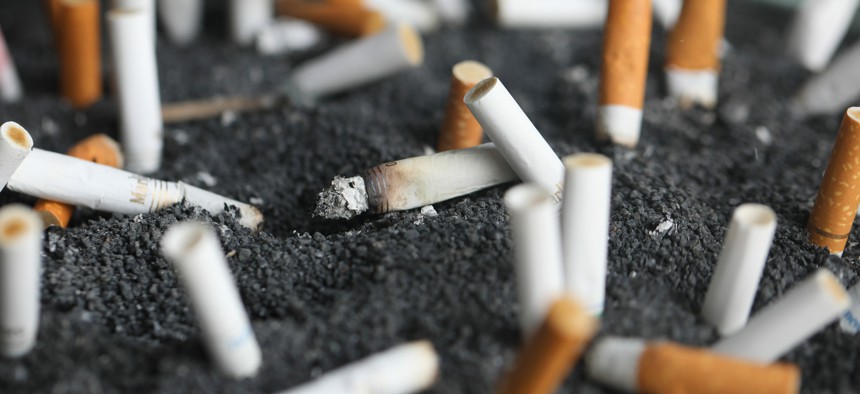Sin Taxes Not a Reliable Source of Revenue, Report Says

This March 28, 2019, photo shows cigarette butts in an ashtray in New York AP Photo/Jenny Kane
States collected $34 million in alcohol and tobacco taxes in 2017, but a tax increase doesn’t always equate to more money as consumer behavior changes.
States routinely increase “sin” taxes on products like alcohol and tobacco to make up lost revenues during an economic downturn, but higher taxes don’t always translate to revenue growth, according to a new report.
Alcohol and tobacco taxes accounted for $34 billion in state revenues in 2017 alone, according to a report from the Urban-Brookings Tax Policy Center. However, the dual goals of sin taxes often conflict, and can create volatile revenue streams, said the report’s author.
“On one hand, the government imposes taxes on these products and activities but at the same they want to reduce consumption,” said Lucy Dadayan a senior research analyst with the tax center. “These two goals are often conflicting… Is the goal to punish that activity or to generate revenue?”
Lawmakers often support sin taxes with the reasoning that increasing the cost of a product can steer people toward making healthier choices and reduce consumption of unhealthy products, like tobacco or sugary sodas.
The Urban-Brookings report warns that sin taxes have limited revenue potential and should not be viewed as a reliable source of income for state and local governments because of the dual motivations behind them.
Tobacco taxes have emerged as a particularly volatile source of revenue, particularly as consumers turn to e-cigarettes (a product now facing other challenges that states have only recently begun to tax).
With smoking generally on the decline, 27 states saw declines in tobacco revenues between 2008 and 2017, including in 12 states that raised the cigarette tax rate during that time.
Tobacco tax revenues across the United States grew overall by less than 1% between 2008 and 2017, the report found.
Per-pack taxes on cigarettes vary widely from state to state, ranging from a low of 17 cents in Missouri to a high of $4.35 in Connecticut and New York, and state tax hikes can shift patterns of consumption in surrounding states, the report notes.
“Cigarette tax rates also can have powerful effects on tax avoidance and evasion: when tax rates rise, taxed consumption of cigarettes in the higher tax jurisdiction may fall considerably,” the report states.
North Dakota was the only state that did not raise its cigarette tax but also saw an increase in tobacco tax revenue. The report said that is likely attributable to cross-border purchases “because the state’s tax rate on cigarettes is $0.44 per pack, much lower than the tax rates on cigarettes in all three border-states: $3.04 in Minnesota, $1.70 in Montana, and $1.53 in South Dakota.”
Florida, which hiked tobacco taxes by $1 a pack in 2009, saw 137% growth in tobacco tax revenues and accounted for much of the overall national tobacco revenue growth during that time. Excluding Florida, tobacco revenues across the rest of the nation declined 3% from 2008 to 2017, the report found.
Less than half the states tax e-cigarettes or vaping products. The report notes that as of September, the District of Columbia and 12 states had enacted taxes on e-cigarettes. Seven other states are expected to begin taxing vaping products in the coming months.
The report also analyzes revenues from alcohol taxes and gambling, finding that alcohol tax revenue increased 14%from 2008 to 2017. Social stigma and health concerns that have led to a decline in smoking have not reduced alcohol consumption in the same way, Dadayan said.
Lottery revenues increased by 6.5 %, while casino and racing-related revenues increased 6.8%, the report found. Dadayan said as more states legalized gambling, the profits have shifted, declining in states that have allowed gambling for longer periods of time.
Sin taxes are largely seen as regressive taxes that disproportionately target low-income households.
If states are hard set on changing consumer behavior, Dadayan said states should look to balance a tax punishment with a reward that steers consumers toward a desired behavior. For instance, when cities have proposed soda or sugary drink taxes, they could also consider options to make free water more available or to reduce costs of healthy drink options, she said.
“A better public policy decision would be not only punish, but also reward,” she said.
Andrea Noble is a staff correspondent at Route Fifty.
NEXT STORY: Cannabis Banking Challenges Go Beyond Pot





